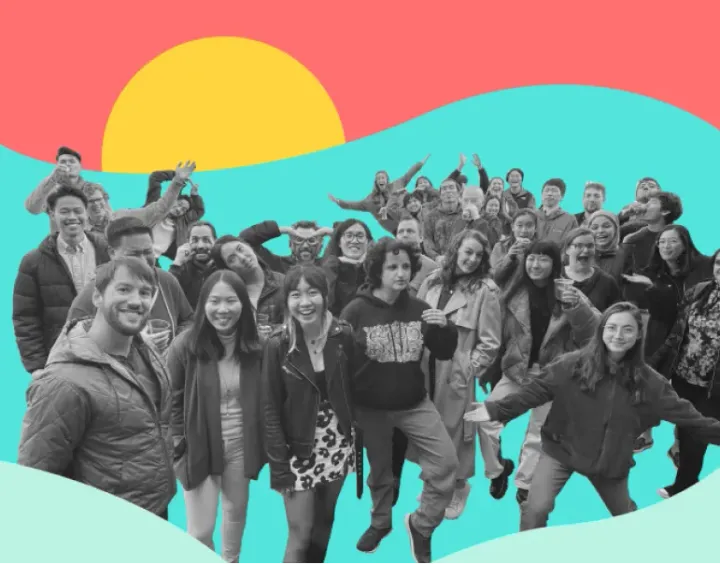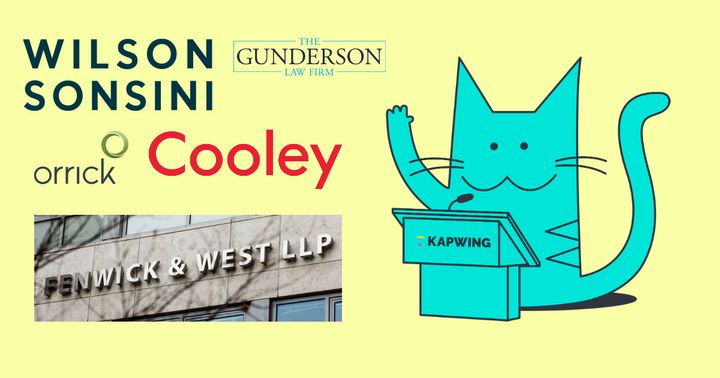How Google's AI Overviews Change SEO Strategy for SaaS Marketers
How should SEO experts and content marketers change their SEO strategy with the new AI Overviews (also called Search Generative Experience) that Google added recently? This article shares how this news has changed our SaaS search strategy.

I'm the cofounder/CEO of a SaaS startup that relies on Search Engine Optimization (SEO) to acquire our customers organically. We've developed an expertise and love for SEO over the last 6 years and have acquired millions of new users (and thousands of dollars) without spending on paid media.
Two weeks ago, at their annual IO conference, Google introduced the new Search Generative Experience (SGE), an AI-powered overview at the top of Google Search that directly answers their question rather than directing them to a relevant search page. "AI Overviews" (which I refer to as SGE in this article) are slowly rolling out across search queries. The AI Overview sometimes shows up at the top of the search results page for both mobile and desktop search.
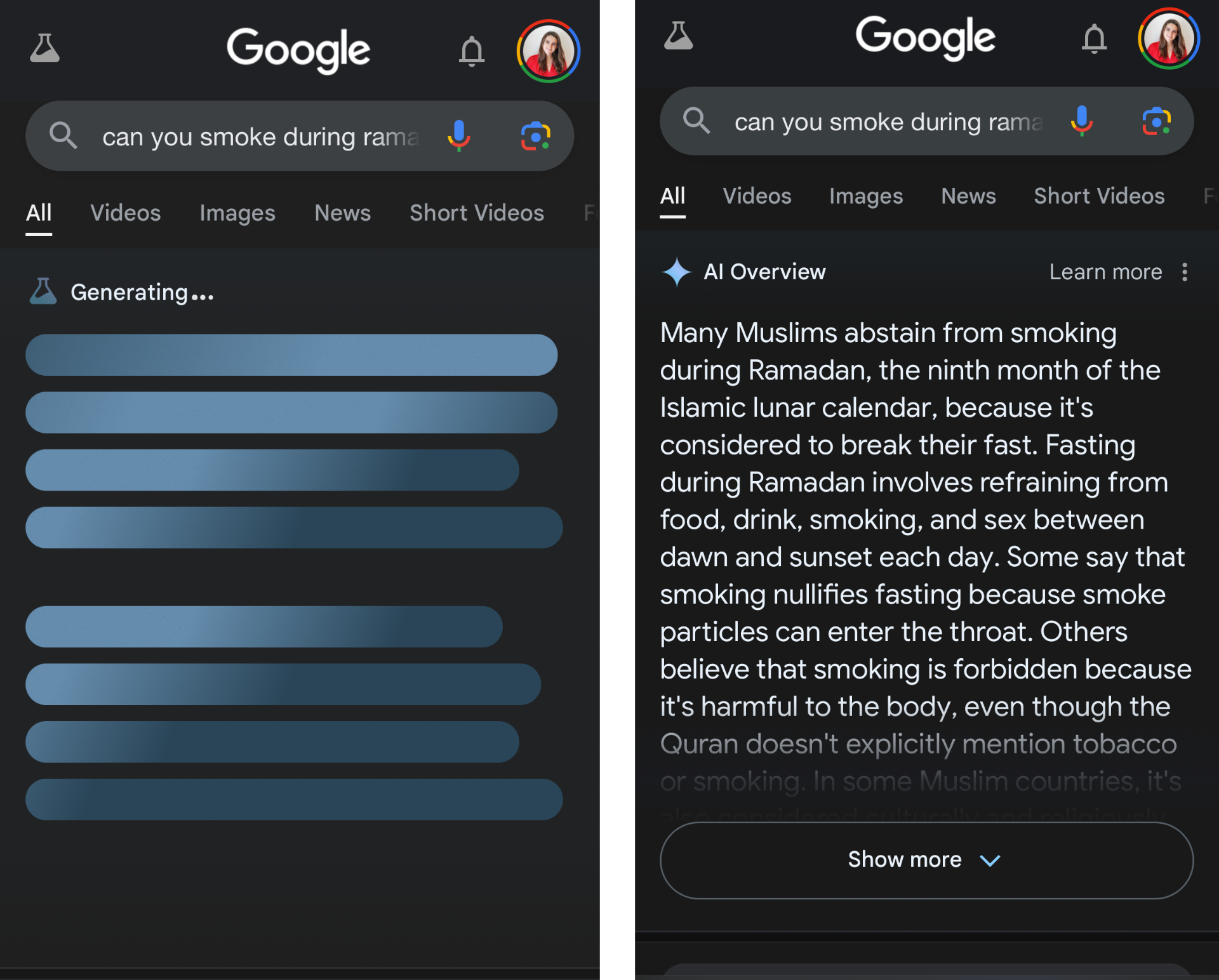
This section at the top of the Search Results Page (SRP) has freaked out many media companies and creative agencies because of its potential to steer traffic away from the open web. Rather than sending curious web browsers to a website with an answer, Google’s LLM extracts the answers from all available websites and delivers the answer itself, pushing down the organic results. Here's a look at the previous results for the same query, which highlighted so-called blue links for publishers like The Conversation, Metro UK, and the National Institute of Health.
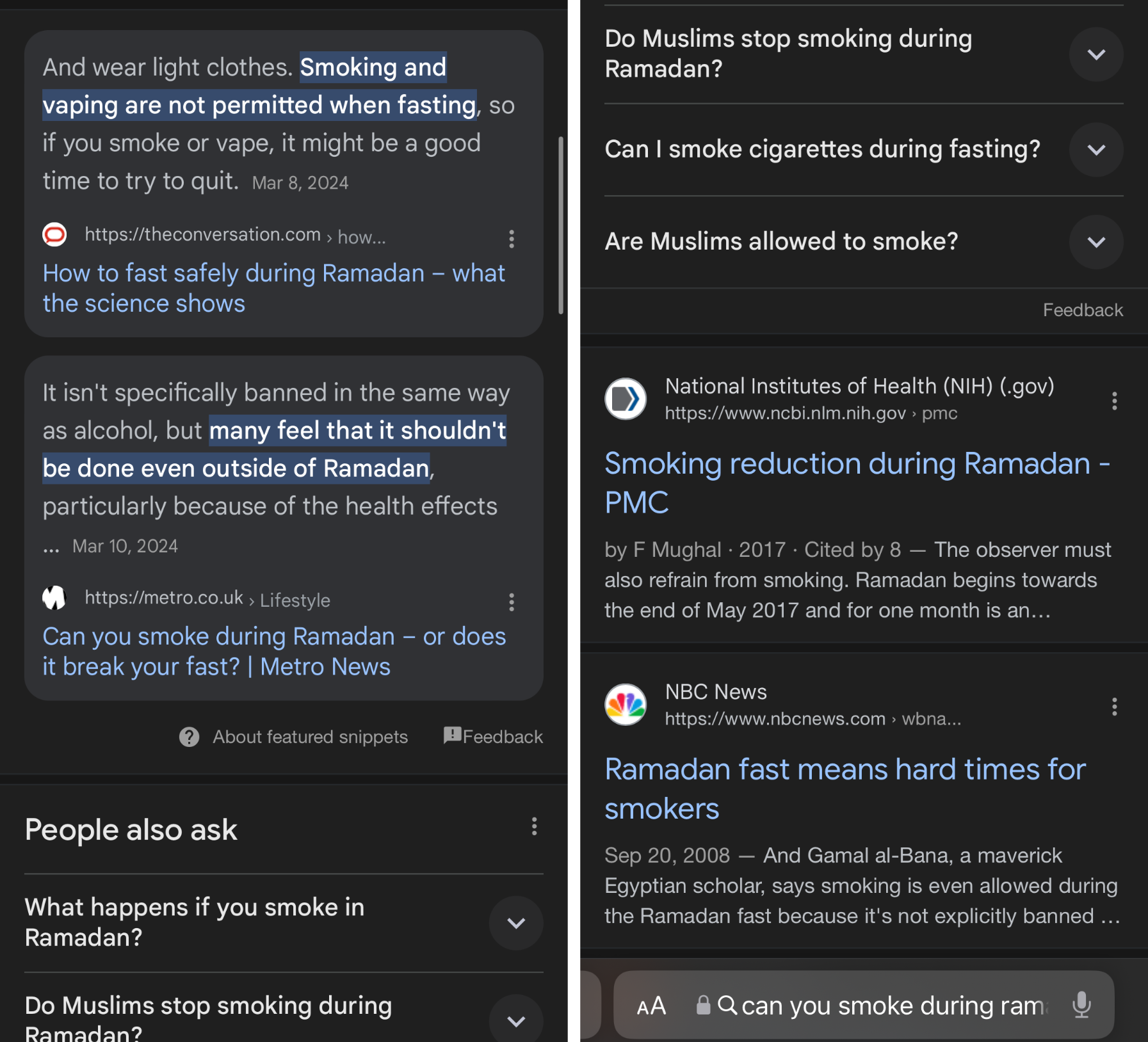
In this article, I’ll describe how I think SGE or AI Overviews will change the game for SaaS, professional service, and ecommerce companies that rely on organic search as an acquisition engine.
How Are We Changing our SEO Strategy
Overall, Kapwing’s SEO mandate has long been centered around our customer: help creators and creative teams navigate the changing world of digital media. SGE does not change this focus. We plan to double-down on original insightful content about digital media. This week alone, we've signed a six-figure contract with an agency and onboarded a new writer for our Resources Library.
However, the introduction of AI Overviews on Google has changed the keyword planning prioritization system of our SEO strategy in two ways:
- Investing more in emerging trends rather than evergreen: SGE will have a hard time picking up and reporting on breaking news which have little content on the internet. I think we can capture long-tail traffic when we are the first to report on emerging and niche platforms, trends, and changes. In contrast, LLMs are generally better at answering “evergreen” questions which have been around for decades, so there’s less opportunity for SaaS companies to capitalize on searchers’ intent.
- Investing more in visual content (video and images) which will be hard for the SGE to compete with. Visual search will still be relevant and important as SGE has essentially no images. So we’re focused more on tutorials that have visual element or where screenshots are important for following the instructions, plus our organic videos on Youtube.
Many people are saying that, long term, SGE increases the importance of first-party channels (like a YouTube channel, substack, or email newsletter). Others say that SGE increases the importance of paid ads. We could invest more in growing the loyalty of our audience there, but that’s hard for a SaaS company to build a brand following like a creator or media company might. We do plan to experiment with video ads and keep up our YouTube community in 2024, but, right now, I think a dramatic pivot away from SEO is premature given that search is still the primary driver of the internet. In the next section, I'll explain why.
SEO is Dead. Long Live SEO.
SGE still has a long way to go before it starts stealing SaaS website traffic. Since the announcement, many searchers have posted on X about poor results generated by SGE, which often hallucinates and gets things wrong. Here’s one of the more egregious examples:
Because of these issues, Google still has a lot of trust to build with searchers and advertisers to ensure that SGE is high-quality enough to cannibalize their own revenue and traffic. Rolling out SGE with the current quality burns user trust in the Google brand, whereas sending traffic to a website that may be incorrect dissociates Google with the false information.
I used to work as a PM on Google Image Search, and the principle of sending traffic to websites was discussed at length. When Google returns results directly (as it does on Image Search) without prominent attribution to the source, big brand issues arise. This is one reason why Google Image Search has apologized over the years for returning too many male CEOs or matching certain human faces for “gorilla.” People blame Google for the results it shows on Image Search in the same way they blame Google for the AI Generated results. And this is a big brand issue for Google.
It appears that Google has been easing off of AI Overview experiments. On my account that is opted into the “AI Test Kitchen,” I cannot get the SGE to show up even for the test queries linked from the landing page. I suspect that Google has turned down the appearance of SGE following the outrage from both web publishers and browsers alike.
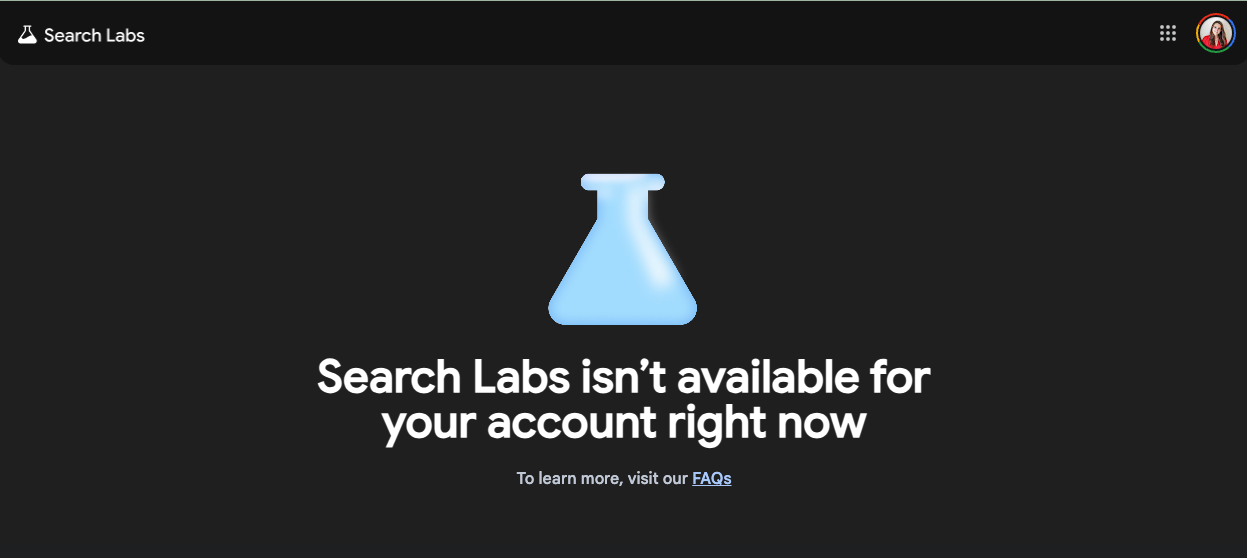
Since launching the AI overviews with much controversy about incorrect results, the tech giant has hustled to respond to, takedown, and restrict AI Overviews when reports of misinformation go public. Google's Head of Search wrote in a blog post two weeks after launch that they'd added restrictions on the use of user-generated content in AI responses "that could offer misleading advice" and " limited the inclusion of satire and humor content." They also "added triggering restrictions," which explains why the results are showing up less often.
However, the appearance that Google (as a company) has authored and endorses the information in AI overviews seems highly problematic for the long-tail of queries it responds to everyday. Hallucinations are a hard problem to solve. I predict that Google will land on a solution that sends users to websites with clear attribution rather than promoting AI-written answers.
Google Search is much more popular than LLMs
ChatGPT launched two years ago, and hundreds of millions of people use and subscribe to the application. Yet it has not come nearly close to recommending as many people to our website as Google and YouTube.
Right now, ChatGPT refers dozens of users a day to our website, whereas YouTube refers thousands and organic search hundreds of thousands. Of course, I got these numbers from Google’s own attribution tools (Google Search Console and Google Analytics), but they still show that LLMs are orders of magnitude less common for researching and finding information about products and services compared to social media and search.
Also, Google has spent the last 15 years focused on rolling out Search to the “Next Billion Users” in Brazil, Pakistan, and Nigeria. LLMs are still much worse for other languages. So SEO will continue to be relevant for a long long time.
SGE Optimization – How Do You Get Recommended?
Today’s hottest topic is SGE optimization – how do you get Google’s LLMs to recommend you when people type commercial queries on search?
As an example, take “best online video editor.” This query has been highly competitive for the last decade. If you get an “AI Overview” from Google, you may notice that it refers you to products. Me and my coworker got different results for this query:
The point is that Google's AI Overviews will send people to SaaS products. It's unclear what products the black box LLM recommends, but there's some evidence that it will help get people where they need to go. Google has certainly touted this point, saying that searchers who see SGE enter more queries and use search more often.
"We see that the clicks to webpages are higher quality — people are more likely to stay on that page, because we’ve done a better job of finding the right info and helpful webpages for them," said Liz Reid, Google's Head of Google Search, said in a blog post.
VERY little is know about SGE optimization, and I’d caution desperate business owners from falling for the “hack SGE” content that has come out this week. Google has invested so little in web tools for publishers around generative AI. Search Console does not differentiate between regular search referrals and generative referrals. This makes me very suspicious that we will know how this "SGE" is impacting our traffic. Also will mean that we'll learn about "LLM Optimization" slowly rather than building up expertise here. Overall, my hunch is that brands who have a long-standing presence online and a lot of content online compared to new competitors will probably get a boost from SGE.
In their Help Center article on AI Overviews, Google has provided little guidance on the topic: "There is nothing special for creators to do to be considered other than to follow our regular guidance for appearing in search, as covered in Google Search Essentials."
Ultimately, I do believe that Google relies on a healthy media ecosystem. If people stop writing because they can't get traffic, Google will have to make a change to improve this, I think. This makes me optimistic about the future for great content providers as it is hard to believe that Google would make a change that is net terrible for publishers, who they depend on. Perhaps this will have the effect of reducing the number of random SEO hackers online and gray-hat link-building tactics.
What about Search Ads?
Google Ads do seem to show up above AI Overviews currently, in their dedicated slot at the top of the search results page. See the below results for "10 ways to reduce climate change," where Sponsored ads show up above the AI Overview which precedes organic results.
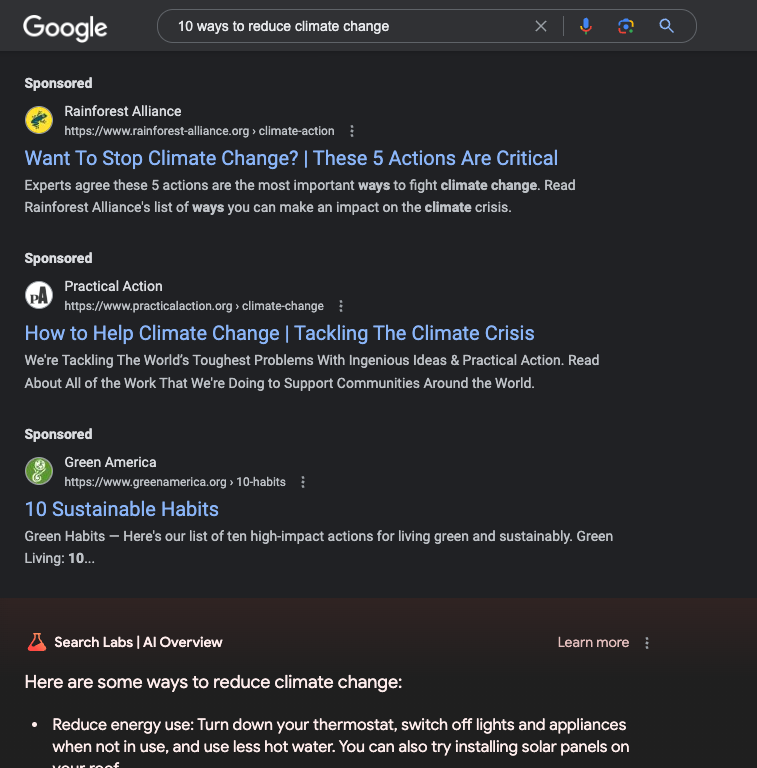
As a result, I think SGE will have a limited impact on Search Engine Marketing (SEM) for the time being.
Conclusion
All-in-all, we plan to approach the future of SEO in the same way we have in the past: produce awesome content that helps users and earns backlinks. We still hope that our customers, users, and brand champions will publish content online (reviews, blog posts, news articles) about our product and hope that SGE will pick up this organic user love. I recommend that other growth marketers, startup founders, and entrepreneurs adopt a similar strategy as it will build brand equity and "Google juice" when done well.


